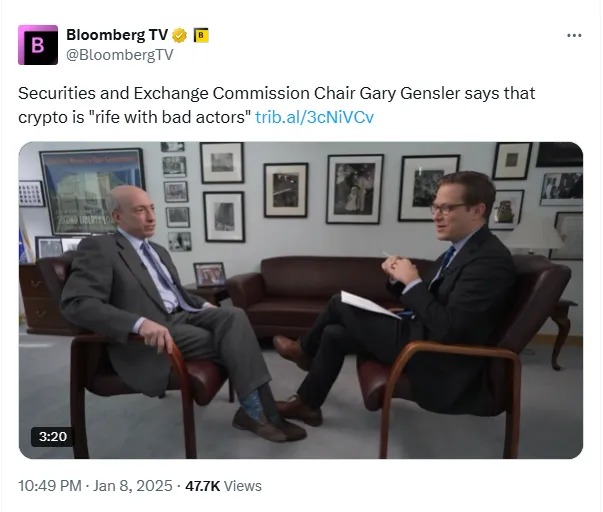SEC Chair Gary Gensler Calls Crypto a “Wild West” Before Stepping Down
Gensler also warned that crypto investments rely heavily on sentiment rather than fundamentals, making them volatile and speculative. According to SEC and Federal Reserve surveys, less than 10% of Americans invest in cryptocurrencies, which Gensler said should prompt caution
Gary Gensler, Chairman of the U.S. Securities and Exchange Commission (SEC), recently discussed his tenure and regulatory actions in a Bloomberg Markets interview. Gensler, who will step down on Jan 20, 2025, reflected on crypto regulation and the broader challenges of overseeing the $120 trillion U.S. capital markets.
During his term, Gensler prioritized enforcement in the crypto industry, describing it as “rife with bad actors.” Under his leadership, the SEC filed over 100 crypto-related cases, following the 80 cases brought by his predecessor, Jay Clayton.
These enforcement actions targeted fraudulent schemes, including pump-and-dump operations and misconduct by figures like Sam Bankman-Fried, Changpeng Zhao (CZ), and Do Kwon. Gensler noted that their activities caused billions of dollars in investor losses, emphasizing the persistent non-compliance within the crypto space.
Bitcoin, which accounts for 66% to 80% of the crypto market, was singled out as a dominant force. Gensler contrasted Bitcoin with the 10,000 to 15,000 altcoins he described as highly speculative, with many unlikely to survive.
Gensler underscored the SEC’s mission to safeguard everyday investors by ensuring market fairness and transparency. He highlighted initiatives such as reducing the stock settlement cycle from two days to one and introducing rules requiring companies to notify consumers of data breaches.
He also warned that crypto investments rely heavily on sentiment rather than fundamentals, making them volatile and speculative. According to SEC and Federal Reserve surveys, less than 10% of Americans invest in cryptocurrencies, which Gensler said should prompt caution.
Gensler emphasized the need for compliance among intermediaries like brokers and exchanges. He noted that these entities often resist changes designed to benefit everyday investors, reflecting broader tensions in the industry.






